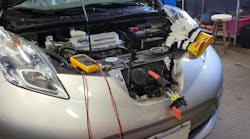As you are well aware, carmakers have been on a mission to meet CAFÉ standards; the standards set by the U.S. government via the National Highway Traffic Safety Administration (NHTSA) to achieve better fuel economy for light duty vehicles (less than 8,500 lbs GVW). This translates to vehicle manufacturers meeting guidelines to have a fleet average of 42 mpg for cars and 26 mpg for trucks, by model year 2016.
While there are a number of loopholes manufacturers have discovered, many companies are also taking legitimate approaches such as smaller and more aerodynamic vehicle bodies, lighter vehicle weight (think: 2015 Ford F-150 aluminum body), and alternative fuels, to name a few.
That being said, vehicle manufacturers are making strides at improving fuel economy through incremental changes as well, such as battery start-stop technology. I spoke with Jim O'Hara at Clore Automotive regarding this technology as one of the methods for improving fuel economy by up to 5 to 10 percent.
While today start-stop technology is primarily seen in aftermarket shops for collision repair, more vehicle manufacturers are making this technology standard in traditional makes and models.
Take the 2015 Ford F150 3.2L EcoBoost, which comes with start-stop standard. While the main vehicle battery assists with start-up and general idling, when the vehicle is stopped for a longer period of time (say, at a train crossing), the start-stop battery will kick in to power the A/C, navigation system, stereo and any other vehicle amenities.
Another example: late-model GM vehicles. With these vehicles, extra vehicle amenities will run on the regular battery until it hits a certain voltage, then it will go back to the auxillary battery.
Manufacturers generally opt for a form of AGM batteries when using them for start-stop technology, due to the lifecycle of the battery.
So how will this technology affect shops? O'Hara explains that while start-stop AGM batteries will charge the same, there will be different methods for testing these batteries. He says about 30 percent of techs currently use the traditional method of battery testing with a load tester. About 70 percent use a digital battery tester to analyze the battery. "With each new battery on the market, there are issues with analyzing the battery, so the testers have to be updated accordingly," say O'Hara.
“Bottom line: assessing battery health is getting more complicated, servicing batteries is getting more complicated, and expensive. Which means we have to have the right tool to get it done,” says O'Hara.
O’Hara also suggests being able to utlize this information for other types of aftermarket shops. Did you know that every 2015 Chevy Impala includes start-stop technology standard on a vehicle? When you’re completing general maintenance checks for a customer, you may be missing the second battery for testing. Now – that customer may still end up at the dealership for warrantied service if the battery is bad – but think of the relationship you’ve established and the credibility you gain by knowing and providing that information.
Think to yourself: When I test every vehicle, do I know that every Impala has a second battery that I could miss?
Even if your shop isn't servicing these cars in a big way now, it's certainly important to educate your customers.


